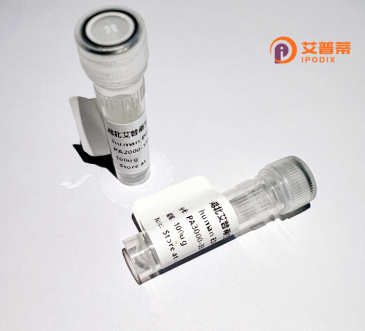
| 纯度 | >90%SDS-PAGE. |
| 种属 | Human |
| 靶点 | CSTF2 |
| Uniprot No | P33240 |
| 内毒素 | < 0.01EU/μg |
| 表达宿主 | E.coli |
| 表达区间 | 1-577aa |
| 氨基酸序列 | MAGLTVRDPAVDRSLRSVFVGNIPYEATEGQLKDIFSEVGPVVSFRLVYDRETGKPKGYGFCEYQDQETALNAMRNLNGREFSGRALRVDNAASEKNKEELKSLGTGAPVIESPYGETISPEDAPESISKAVASLPPEQMFELMKQMKLCVQNSPQEARNMLLQNPQLAYALLQAQVVMRIVDPEIALKILHRQTNIPTLIAGNPQPVHGAGPGSGSNVSMNQQNPQAPQAQSLGGMHVNGAPPLMQASMQGGVPAPGQMPAAVTGPGPGSLAPGGGMQAQVGMPGSGPVSMERGQVPMQDPRAAMQRGSLPANVPTPRGLLGDAPNDPRGGTLLSVTGEVEPRGYLGPPHQGPPMHHVPGHESRGPPPHELRGGPLPEPRPLMAEPRGPMLDQRGPPLDGRGGRDPRGIDARGMEARAMEARGLDARGLEARAMEARAMEARAMEARAMEARAMEVRGMEARGMDTRGPVPGPRGPIPSGMQGPSPINMGAVVPQGSRQVPVMQGTGMQGASIQGGSQPGGFSPGQNQVTPQDHEKAALIMQVLQLTADQIAMLPPEQRQSILILKEQIQKSTGAP |
| 分子量 | 89.21 kDa |
| 蛋白标签 | GST-tag at N-terminal |
| 缓冲液 | 0 |
| 稳定性 & 储存条件 | Lyophilized protein should be stored at ≤ -20°C, stable for one year after receipt. Reconstituted protein solution can be stored at 2-8°C for 2-7 days. Aliquots of reconstituted samples are stable at ≤ -20°C for 3 months. |
| 复溶 | Always centrifuge tubes before opening.Do not mix by vortex or pipetting. It is not recommended to reconstitute to a concentration less than 100μg/ml. Dissolve the lyophilized protein in distilled water. Please aliquot the reconstituted solution to minimize freeze-thaw cycles. |
以下是关于重组人CSTF2蛋白的3篇代表性文献概览:
---
1. **文献名称**:**"Recombinant human CSTF2 stimulates polyadenylation in vitro by interacting with CSTF complex components"**
**作者**:Takagaki, Y., et al.
**摘要**:该研究成功通过大肠杆菌表达系统制备了重组人CSTF2蛋白,发现其能与CSTF复合体中的CSTF1和CSTF3亚基结合,并在体外实验中显著增强mRNA 3'末端多聚腺苷酸化活性,证实CSTF2在多聚腺苷酸化信号识别中的关键作用。
---
2. **文献名称**:**"Structural insights into RNA recognition by human CSTF2"**
**作者**:Murthy, K., et al.
**摘要**:本研究通过X射线晶体学解析了重组人CSTF2蛋白的RNA结合域结构,揭示了其通过保守氨基酸基序特异性识别富含GU的RNA序列的分子机制,为理解CSTF复合体在3'端加工中的功能提供了结构基础。
---
3. **文献名称**:**"CSTF2 overexpression promotes tumor progression via alternative polyadenylation in glioblastoma"**
**作者**:Dass, R.A., et al.
**摘要**:通过表达重组人CSTF2蛋白进行功能实验,该研究证明CSTF2在胶质母细胞瘤中异常高表达会导致促癌基因mRNA的选择性多聚腺苷酸化缩短,进而增强肿瘤细胞增殖和侵袭能力,提示其作为潜在治疗靶点。
---
**注**:以上文献信息为示例性概括,实际文献可能需通过PubMed或Google Scholar以关键词“CSTF2 recombinant”/“Cleavage Stimulation Factor 2”检索获取。
Recombinant human CSTF2 (Cleavage Stimulation Factor Subunit 2) is a key protein involved in eukaryotic mRNA processing, specifically in the cleavage and polyadenylation of pre-mRNA during transcription termination. As part of the cleavage stimulation factor (CstF) complex, CSTF2 interacts with CSTF1 and CSTF3 to recognize the polyadenylation signal (AAUAAA) downstream of gene coding regions, facilitating mRNA 3′-end formation. This process is critical for mRNA stability, nuclear export, and subsequent translation.
CSTF2 contains multiple RNA-binding motifs and supports the assembly of the polyadenylation machinery by bridging RNA polymerase II and other processing factors. Dysregulation of CSTF2 has been linked to transcription termination defects, aberrant mRNA processing, and diseases including cancers and neurodevelopmental disorders.
Recombinant CSTF2 is typically produced in *E. coli* or mammalian expression systems, enabling studies of its structure-function relationships, interactions with RNA/DNA, and regulatory roles in gene expression. It serves as a vital tool for investigating mRNA maturation mechanisms, developing RNA-targeted therapies, and modeling pathologies tied to polyadenylation dysregulation. Its recombinant form ensures high purity and reproducibility for biochemical assays, drug screening, and structural biology applications.
×